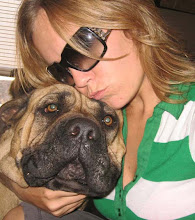
The German Shepherd is a very strong dog breed so you need to train him or her to walk beside you first off. This will keep them from taking you on a walk! For more control of your dog, using a choke chain or a harness is recommended. Treats always work wonders with German Shepherds when it comes to training them and rewarding them for good behavior.
This breed needs a lot of exercise so that is something you need to take into account before bringing one home. If you already have one then you know they need a good lengthy walk everyday. It will keep them happy, healthy and sane. Socializing them on walks beginning at a young age is extremely important so they learn how to interact with humans and other dogs without being aggressive. This way you will see how they react in these situations and you can correct them right away if needed.
I suggest you working with your German Shepherd amongst family pets and friends before taking him/her out into the public. You must make sure they are prepared and will listen to every command you give them when around others so you don't have any problems. German Shepherds are great dogs and deserve all the love and attention you can give, they will do the same for you :)






